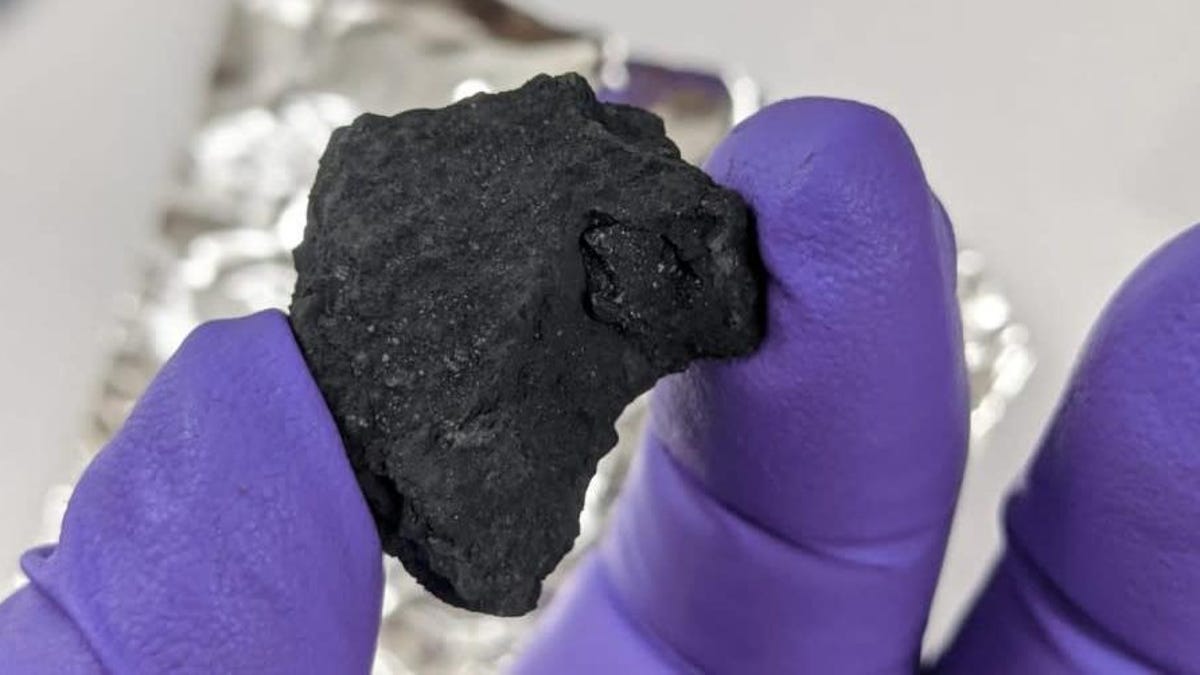 –
––
A chunk of black rock dating from the early days of the solar system has fallen into a residential driveway in Great Britain.
Late last month, a rock weighing about 10.6 ounces (300 grams) was run over by Rob and Katherine Wilcock, who live in the small town of Wincombe. United Kingdom.
“When I heard it fall, I stood and looked out the window to see what was there. But because of the darkness, I could see nothing. ”Hana, the couple’s daughter, Telling BBC. “The next morning when we went out, we saw him on the street – it was like a splash of liquid. And to be honest, my original idea was – is someone driving around the Cotswolds throwing lumps of charcoal into people’s gardens? “
A piece of coal, no. Rather, it is a meteor. And not just any meteorite – these are chunks of chondrite carbonate that are thought to be about 4.5 billion years old, and come from the formation of the solar system, according to statement From the University of Manchester.
“Nearly all meteorites come to us from asteroids, and they are the remaining building blocks of the Solar System that can tell us how planets like Earth formed,” Ashley King, future pioneer in research and innovation in the United Kingdom in the Department of Earth Sciences at the Museum of History Nature, said In his statement. “The opportunity to be the first to see and study a meteorite found immediately after falling is a dream come true!”
G / O Media may charge you a commission
–
–
 –
––
Rare specimens arrive at the Fire of Glory, as the rock lights up the skies over Britain and Northern Europe on February 3. 28, 2021. A fireball entering the Earth’s atmosphere at a speed of 8.7 miles per second (14 kilometers per second)), It was discovered by thousands of witnesses, many of whom reported the incident British Meteorite Watch Network.
Wide camera footage taken from multiple angles allows scientists to track landing points, as well as recreate flight paths through the solar system, according to the University. Manchester Statement. The remains of another destroyed asteroid are believed to have fallen into it The area is known as the CotswoldThis search for valuables continues.
Along with the main chunks, there are other smaller shards from the meteor impact Driving path. Even though it was a dusty torn mess, the pieces In perfect condition, compared to the original samples returned from the space mission.
“I was shocked to see it and immediately knew it was a rare meteorite and a truly unique event,” said Richard Greenwood, a researcher at the Open University, in the statement. “It’s emotional to be the first to convince the people standing in front of you that the sounds they heard in the corridor all night were actually the real thing.”
Carbonate chondrites are made from a mixture of minerals and organic compounds, such as amino acids. By studying these ancient objects, scientists can look back to the early days of the solar system, enabling them to better understand the origin of planets and waters, and how the ingredients that made up life got to Earth.
Rob Wilcock told the BBC: “We are very pleased that something that will be so valuable to science, to human understanding of the world and the solar system has happened, and we can be a small part of it.”
The meteorite will be transported to the Natural History Museum, allowing an official investigation into the object.
Of the tens of thousands of known meteorites on Earth, only 51 are carbonate chondrites. The meteorite from February 28 was the first carbon chondrite to be discovered in the UK. The first meteorite samples to be taken in the province since 1991.
–


